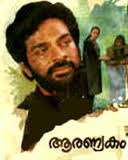Aranyakam
| Aranyakam | |
|---|---|
 Theatrical poster | |
| Directed by | Hariharan |
| Produced by | B. Shashi Kumar |
| Written by | M. T. Vasudevan Nair |
| Starring |
Saleema Devan Vineeth Nedumudi Venu Jagannatha Varma Parvathi Bahadoor Sukumari |
| Music by | Raghunath Seth |
| Cinematography | Venu |
| Edited by | M. S. Mani |
Production company |
Mudra Films |
| Distributed by | Mudra Release |
Release date |
|
| Country | India |
| Language | Malayalam |
Aranyakam (Malayalam:ആരണ്യകം, English:Forest) is a 1988 Malayalam film directed by Hariharan, written by M. T. Vasudevan Nair, and starring Saleema, Devan and Vineeth.[1][2] The film was produced by B. Sasikumar.[1] Music was composed by Raghunath Seth, lyric-ed by O. N. V. Kurup, and vocals by K. J. Yesudas, and K. S. Chitra.[1] It is about a teenage girl named Ammini who likes to visit forests and has a hobby of writing imaginary letters to famous people.Actress Saleema memorably portrays Ammini. She remains one of the few quirky female characters in Malayalam cinema till date.
Plot
The film handles the issue of exploitation of Adivasis by feudal lords, and that of Naxalism which attempts to resist and counter this, and of how the feudal lords use the 'system' to suppress the resistance. The film speaks through the eyes of protagonist Ammini(Saleema), a 16 old girl whose life takes a turn when Mohan (Vineeth), who has love interest on her and a stranger (Devan) who inspires her and believes in her brilliance unlike everyone else, enters her life. The latter turns out to be a Naxalite who has been conspiring to kill her uncle, a feudal lord (Jagannatha Varma) who has been exploiting the tribal community in the area for his own personal interests.
Cast
- Saleema as Ammini, the protagonist who aspires to be a writer.
- Devan as a naxal activist.
- Vineeth as Mohan, cousin of the protagonist, and a research scholar who does an academic research on Adivasis.
- Nedumudi Venu as a feudal lord, and grandfather of the protagonist.
- Jagannatha Varma as Madhavan Nair, a feudal lord, and a relative of the protagonist.
- Parvathy as Shailaja, a cousin of the protagonist.
- Balan K. Nair as Ravunni, a police officer.
- Bahadoor as Nanu, house keeper at the feudal home.
- Prathapachandran as Nambiar
- Captain Raju as a police officer
- Sukumari as Madhavan Nair's wife
- Valsala Menon as Nambiar's wife
Sound Track
The film's soundtrack contains 4 songs, all composed by Raghunath Seth and lyrics penned by O. N. V. Kurup.
| # | Title | Singer(s) |
|---|---|---|
| 1 | "Athmaavil Muttivilichathu" | K. J. Yesudas |
| 2 | "Olichirikkaan Vallikkudilonnorukki" | K. S. Chitra |
| 3 | "Thaarakale" | K. S. Chitra |
| 4 | "Thanichirikkaan Ivide Enikkkoru (Slow)" | K. S. Chitra |
References
External links